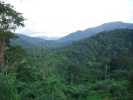
The oil palm (Elaeis guineensis) is native to to west and southwest Africa. After being planted for decades in Southeast Asia, now the plantations are coming back to the African continent. But it is no more the palm that was part of the local flora. What we now arrive, led by bulldozers of multinational agribusiness, it is an army of homogenous and rapidly growing single species of trees of the same age that are sawn to occupy precious rain forests and fields of small peasants. Cameroonians from Ebanga village realized soon what means the expansion of oil palm plantations for their own forests. The US agribusiness company Herakles Farms obtained permits to convert their forests into a large palm oil plantation their land, and this will have huge effects on the lives, of residents.
Herakles claims they have already consulted with the large majority of people in the area. However, after a field trip in the area, as local NGOs and Greenpeace show a different picture.
Many villagers have been excluded from the process. It is true that several village chiefs (some of whom are rarely present in their village) have made land deals with the company, but the majority of villagers have little to no input. Some villagers say they signed an agreement with Herakles without fully understanding the fine print and now feel they feel trapped.
Now the Babensi forest has been cleared. The villagers long ago said they did not wish to be part of Herakles’ plantation. But their voices are now part of a long list of people's that the company’s executive refuses to listen to. “We have written so many complaints about Herakles Farms,” says Adolf Ebong Ndbe, the regent of the village. "How can they enter our land without permission?"
The villagers rely on the forested land behind their homes for their livelihoods. But they say the actions of Herakles mean it is their children who will miss out. “In future we are worried that our children will not even get to see the animals that live in the area,” says John Ebenki, a villager.
The villagers are now taking their complaints to the relevant authorities, but that does not seem to deter Herakles. Only two weeks after our visit, a team of local NGO members and a Greenpeace campaigner were ambushed and assaulted by Herakles employees in this same spot, continuing their heritage of using intimidatory tactics and violence to try and suppress Cameroonian civil society and any local opposition to their work.
This is not an isolated incident. Companies like Herakles need to be shown that they are acting irresponsibly and badly when it comes to the continent's palm oil production.


